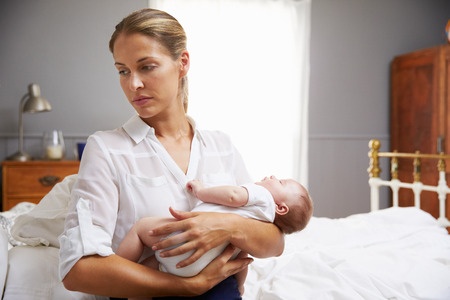 Post-partum depression includes intense feelings of sadness, hopelessness or despair that occur up to one year after a woman gives birth. The feelings are so severe that they interfere with daily living.
Post-partum depression includes intense feelings of sadness, hopelessness or despair that occur up to one year after a woman gives birth. The feelings are so severe that they interfere with daily living.Understanding Post-Partum Depression
Some women experience mood changes 2 to 3 days after giving birth. These “post-partum blues” may produce mild symptoms of unexplained anger, depression or anxiety lasting up to 2 weeks. These feelings are likely linked to the sudden hormone fluctuations associated with the end of pregnancy due to childbirth or miscarriage.
Sometimes the symptoms intensify to the point they interfere with daily living. This condition, known as post-partum depression, can lead to feelings of hopelessness and even suicidal thoughts.
Women are more likely to experience post-partum depression if they have a history of depression, are living in a stressful situation, have bipolar disorder or premenstrual dysphoric disorder. Hormonal changes, fatigue, stress, unplanned pregnancy or difficulty adjusting to the idea of parenthood may also contribute to post-partum depression.
Symptoms of Post-Partum Depression
There are a number of symptoms associated with post-partum depression. Since most women experience a variety of emotions after childbirth, a diagnosis should not be based one or two symptoms alone. However, women who persistently suffer from a combination of the below symptoms should consult their OBGYN:
- Intense feelings of sadness
- Disinterest in normal daily activities
- Weight changes, both loss and gain
- Fatigue or loss of energy
- Low self-esteem
- Sleep changes, including sleeping too much or too little
- Difficulty focusing on tasks
- Memory problems
Severe cases of post-partum depression can lead to thoughts of suicide or even causing harm to your newborn. These thoughts should be immediately reported to your obstetrician and treatment quickly initiated.
Treatment of Post-Partum Depression
Treatment of post-partum depression includes medications and counseling.
Antidepressants are medications that balance the brain chemicals responsible for controlling moods. One or more antidepressants may be prescribed and the dosage adjusted to reduce symptoms. It may take up to one month to for the medications to reach maximum effectiveness.
Psychotherapy has also been found to be helpful in the treatment of post-partum depression. Talking about your feelings may help in managing them. Often couples participate in the sessions together.
Women who have a history of depression should discuss this with their obstetrician during pregnancy. Initiating treatment immediately after childbirth could prevent symptoms of post-partum depression.
